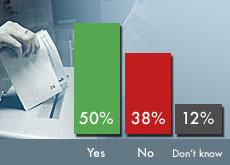
EU labour accord vote remains undecided

A majority of Swiss back extending the free movement of people to the new European Union members, but the outcome of the vote remains unclear, says a poll.
The third and last survey by the GfS institute, commissioned by the Swiss Broadcasting Corporation, found that 50 per cent would vote yes and 38 per cent no, with 12 per cent undecided.
With less than two weeks to go before the crucial ballot on September 25, Wednesday’s results show that the yes camp has made up some ground since the vote campaign began. But the narrow gap between the two sides means the no camp could still prevail.
The first poll at the beginning of July showed only 43 per cent in favour of extending the EU labour accord to mostly eastern European workers. This rose to 49 per cent a month ago and 50 per cent by mid-September.
Opponents started out with 40 per cent, before losing four percentage points in the second survey. This has now increased slightly to 38 per cent.
The number of undecided voters has continuously dropped – from 17 per cent in July, to 15 per cent in August and settling at 12 per cent in September.
Less emotional
GfS experts say that support for the accord has grown because the campaign has become less emotional.
The outcry over controversial statements by a senior EU official ahead of the first poll in July has also died down.
Many people were displeased when the EU foreign affairs commissioner, Benita Ferrero-Waldner, said that Swiss voters had to approve the labour accord if they wanted to be part of the passport-free zone.
In June the Swiss electorate approved the Schengen/Dublin accords on closer security and asylum cooperation with the EU.
The GfS said that the Ferrero-Waldner’s comments coincided with the lowest percentage in favour of the accord (39 per cent). But the campaign has since concentrated on more practical issues such as emigration, salaries and the economy, which has been to the yes camp’s favour, said the institute.
Typical voters
The survey gives a clear picture of who is likely to vote for or against extending the accord to the ten new EU member-states.
It shows that the closer to the right of the political spectrum, the more marked the opposition to the move.
Among the four political parties in government, the centre-left Social Democrats recorded the highest level of support at 78 per cent, whereas the rightwing Swiss People’s Party only recorded 11 per cent in favour.
There were also more yes voters among the French-speaking Swiss and those living in urban areas. The GfS also noted that those with a higher level of education were more likely to vote for the accord.
Uncertain
However, the GfS warned that Wednesday’s poll would not necessarily predict the outcome of the vote.
Opponents tend to gain ground ahead of the ballot day, the institute said, as illustrated by the results of the Schengen/Dublin vote. In the last survey before the vote, supporters had 55 per cent and opponents had 35 per cent.
In the end, the accords were accepted by 55 per cent, but the percentage of those against had risen to 45 per cent.
GfS added that the difference separating the two camps was very small at 12 per cent. “The result is completely open,” said the institute.
swissinfo, Olivier Pauchard
The latest GfS poll results:
50 per cent of those polled are in favour.
38 per cent are against.
12 per cent are undecided.
There was 53 per cent participation in the survey.
The survey took place between September 5-10.
1,202 people were polled (300 in the French-speaking part of the country, 301 in the Italian-speaking part and 601 in the German-speaking part.)
The error margin was +/- 3.5 per cent.

In compliance with the JTI standards
More: SWI swissinfo.ch certified by the Journalism Trust Initiative






























You can find an overview of ongoing debates with our journalists here . Please join us!
If you want to start a conversation about a topic raised in this article or want to report factual errors, email us at english@swissinfo.ch.